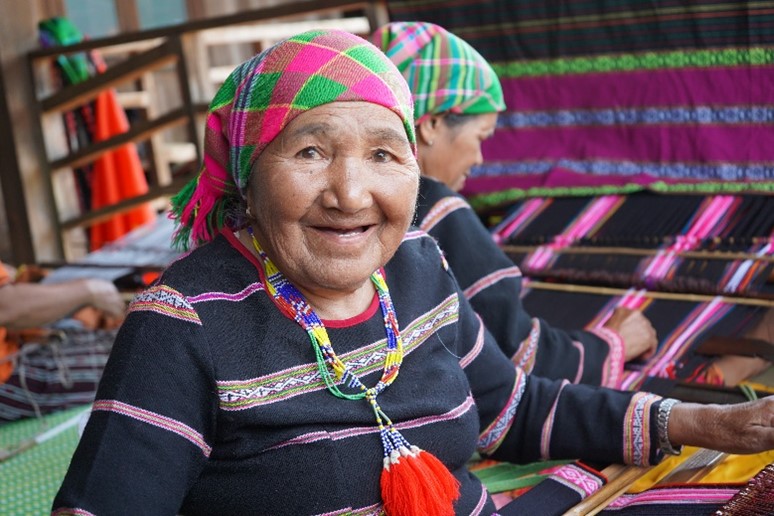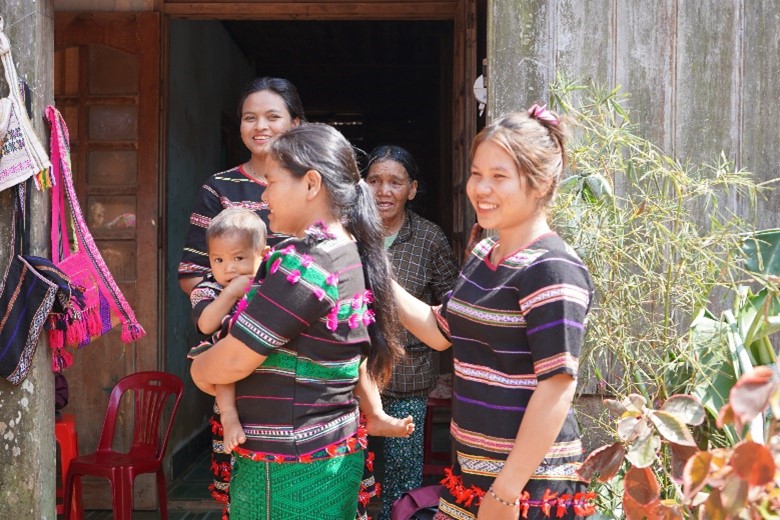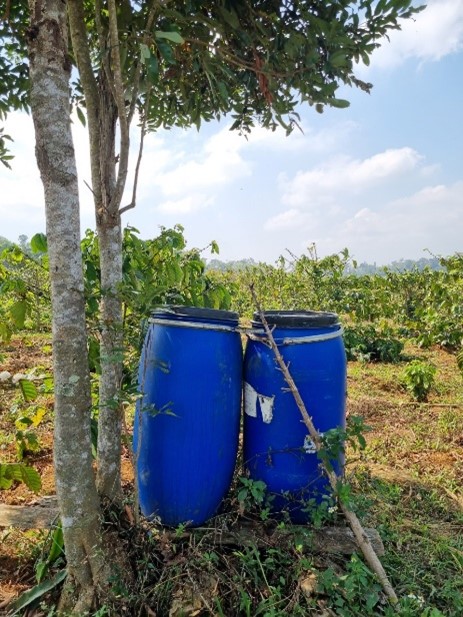By Bui Hoa Binh, Do Trong Hoan, Nguyen Thi Phuong Dung
Un Hang and Her Nameless Stream
April 26, 2023

Un Hang, an 83-year-old elder in the M'nong village of Quang Son commune in the Central Highlands, recounts her cherished childhood memories.
Un Hang, a M’nong village elder, sits by the weaving looms in Quang Son commune in the Central Highlands, and takes a trip down memory lane. Her heart longs for the past when the stream flowed abundantly with crystal-clear water, so pure, sweet and no pollution at all.
The nameless stream, known simply as 'our stream' by Un Hang and the villagers, was vital to their community. It nourished both the people and their buffaloes, with each household owning hundreds of them. To safeguard the buffalos from tigers, they built fences in the dense and ancient forests.
Now, at the age of 83, Un Hang says the landscape is almost unrecognizable. Natural forests have been cleared to make way for plantation forests and agricultural land.
All over Viet Nam, especially in the Central Highlands region, forests have been under threat.
In the 15 years between 2005-2020, the natural forest area in the Central Highlands shrunk by almost 700,000 hectares, from 2.83 million to 2.18 million hectares, mostly attributable to the expansion of coffee, rubber, and timber plantations.
Loss of forest cover and overuse of chemical fertilizers and pesticides for agricultural production have led to serious environmental problems, water shortage, and pollution.
Deforested watersheds are unable to properly filter water and regulate water supply for the communities that depend on them. The stream that was once cherished by Hang and her fellow villagers has now dwindled and become polluted.
“I am so sad that my great-granddaughter may never have the chance to feel how abundant, sweet, and clean the stream was. It is so polluted and much less water now. I am afraid that when she grows up, our stream may even disappear. No water at all,” Hang says.

Un Hang’s daughter, her granddaughter, and other M’nong village women.
Sadly, deforestation and unsustainable agricultural production not only compromises watershed health but also, sustainable social and economic development.
Unless remedial and supportive action is taken this new trend may seriously affect smallholder farmers, especially women and ethnic minorities, who are the most vulnerable in the supply chain.
One initiative to protect smallholder farmers is the iLandscape project, funded by the European Union and implemented by UNDP. The project is supporting Lam Dong and Dak Nong provinces to manage landscape in a sustainable and integrated way, benefiting about 30,000 farmers.
It provides technical support for farmers to implement sustainable farming practices, such as intercropping or cultivating sustainable non-timber forest products and demonstrate business case of such transformations to attract financial investment.

Two vats of fish fertilizer, crafted from a blend of fish and molasses, undergo a two-week composting process, resulting in a potent and eco-friendly fertilizer that is ideal for nourishing coffee trees. This natural alternative enables farmers to reduce their reliance on chemical fertilizers, saving both money and resources in the process.
“The iLandscape project aims to address both governance and supply chain problems that are co-contributing to deforestation, land degradation, and unstainable livelihoods (especially those of marginalized households) in the Central Highlands,” said UNDP Deputy Resident Representative Patrick Haverman. “As a result, local farmers will enjoy better and more diverse income from their farms and forests, while still protecting the environment and forest.”
Sound technologies will help them save water and other agricultural inputs, while the farmgate prices of sustainably cultivated products will increase as they can enter higher-end markets.
When farms and forests are protected properly, the clean ground water will come back.
Hopefully, future generations, such as the great-granddaughter of Un Hang, will have the opportunity to experience the sweetness and purity of the nameless stream.
She may even have the privilege of naming it.
To read more about the iLandscape project, click here.

Sisters from Dao, Tay, Nung & M’Nong minorities are joining together to learn how to adopt circularity in coffee farms.
7726,7866,7856,7121,6876,6396

 Locations
Locations



